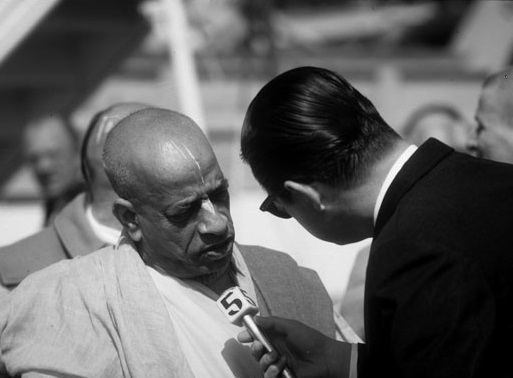Reporter: Prabhupada, it's been thirty-five years since you were given this mission by your spiritual master to bring the word of Kṛṣṇa to the West. A lot has happened in the world over that period of time. The world has...
Prabhupada: That is nothing. That period of time is relative. As human beings, we live for some time—say for a hundred years—but there are demigods who can live for millions of years. And an ant will live for only a few hours. So this is relative. But time is eternal, and what is happening in so-called human history has no consideration from the viewpoint of eternal time. That is all relative. If there is some catastrophe in ant society, the ants may be very much concerned, but human society does not take any notice of it. Similarly, if a catastrophe occurs in human society, the demigods, who are higher than us, do not consider it. Some birds or cats or dogs may be fighting, and for them it may be a catastrophe, but for us it is nothing.
This is the relative world, and we should know that what has happened in this world is not worthy of consideration in terms of universal affairs. Things are coming and going like seasonal changes. Arjuna put this question to Kṛṣṇa: "This is a catastrophe! I have to kill my own men." Although Arjuna believed this to be a catastrophe, Kṛṣṇa likened it to seasonal changes. Mātrā-sparśās tu kaunteya śītoṣṇa-sukha-duḥkha-dāḥ (BG 2.14): "O son of Kuntī, the nonpermanent appearance of happiness and distress and their disappearance in due course are like the appearance and disappearance of winter and summer seasons."
In the winter season water is not very pleasant, but in the summer it is very pleasing. What, then, is the condition of water? Is it pleasing or not? The water is the same, but in touch with our skin it becomes pleasing or not according to the climatic circumstances. Just because the summer is hot, should I give up cooking? Work must be done. Similarly, just because water is cold in the winter, should I give up my bath? No. These things may come and go, but we have to do our duty.
Our duty is Kṛṣṇa consciousness. That is our philosophy, and that is an actual fact. These seasonal changes may come and go in life— sometimes they may please us, and sometimes they may pinch us— but our duty in human life is to understand God. We shouldn't care for all these catastrophes that come and go. We should have no concern, for their nature is like that—sometimes pleasing and sometimes not pleasing. Despite all this, we have to do our duty, understand God.
(Srila Prabhupada Interview, New Vrindaban, September 2, 1972)
.

